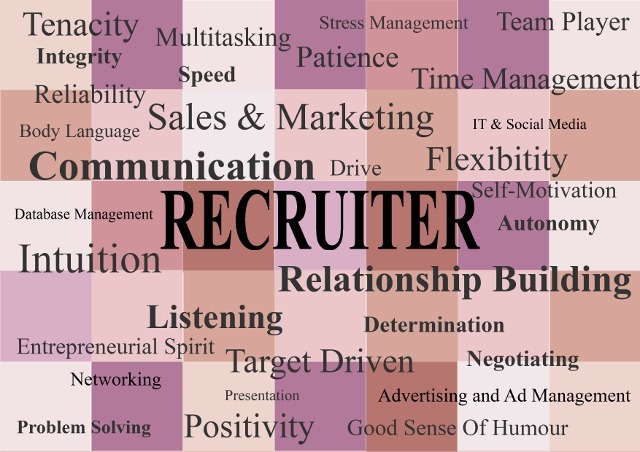 This article outlines the role, process, and explains the skills needed to be a successful recruiter.
This article outlines the role, process, and explains the skills needed to be a successful recruiter.
There is no such thing as a perfect recruiter. You are always learning and developing skills.
However, over the years, I have gained a good insight into what I feel makes myself and others successful in this business.
How I became a recruiter…
Recruitment is not a career that many people choose.
It seems to be a profession you stumble into.
When I was younger, I wanted to be a physiotherapist. Recruitment was not even a blip on my radar. However, after graduating, I started working as a Medical Sales Representative and sales became something of real interest to me.
It was during this time that I registered with my first agency to help me find work. I saw the recruitment industry, for the first time, from a candidate side. It looked like an interesting career, combining sales with my desire to work in a role where I could possibly help people. I applied for a number of recruitment positions and landed my first role as a Trainee Recruiter.
That was 12 years ago, when CVs were faxed rather than emailed and candidates’ profiles were stored in filing cabinets rather than a file on your hard drive. Oh, how times have changed.
One of the many things I have learnt from my time in the industry is that recruitment is tough. Many people leave the industry within the first year of starting and the ones that remain are made of sturdy stuff.
“We’re not all bad…”
Having worked for various companies and organisations in the UK and here in Switzerland, I have also worked, on numerous occasions, with recruiters when I have been looking for new opportunities.
I am sure everyone has had experience of working with a recruiter, either directly or with an agency recruiter during their job hunt. Many would have formed an opinion – often negative - based on these experiences.
Recruiters are known to have a bad reputation. As a role, recruitment is fundamentally a sales position. However, for me, a good recruiter needs to possess an excellent balance between sales and relationship building. My insight is that the majority of bad experiences come down to the lack of real relationships with the recruiter.
So what does a recruiter actually do...
The role of a recruiter is more complex and varied than people may think and can be extremely challenging, but that also makes the role exciting.
“A recruiter is the intermediary between companies/organisations wishing to recruit (the client) and the individual seeking a career move or temporary assignment (the candidate)”
Employers may use recruitment consultancies or agencies to find otherwise scarce candidates. People who, in many cases, may be content in their current positions and are not actively looking to move.
Clients do not get charged for the service of an agency or recruiter until they find the right candidate for them. This puts a lot of pressure on a recruiter to work quickly and effectively so they fill a role and actually get paid for the work that they have put in.
Although agencies tend to specialise within their own market niche, the role of a recruiter remains essentially the same.
Recruitment is fundamentally a sales role, in which they sell numerous “things”.
- Firstly, they sell the services of the agency and their skills as recruiters to the client and candidates.
- Secondly they sell the job positions from a company to candidates.
- Lastly, they sell the candidate and their experience to the client.
This is no easy feat, as the ‘products’ (the candidate/clients) change each and every time. A recruiter, works with people not objects. People can be unpredictable and let you down. And they do…A LOT. Just when you think you have seen or heard it all… ”Surprise! Here is a new one!”
Surprises can come in all shapes and sizes and often do, not in a good way and sometimes at the very last minute. After a while in recruitment you tend to be very good at working under pressure, using your initiative and become very good at reading people and that is not all……
The ideal recruiter will:
- Identify and develop client business relationships in a competitive environment/industry
Relationship building is key, as well as the ability to acknowledge and understand the needs of the client. You need to be able to know exactly what a client is looking for in terms of experience, skill set and personality that would fit well in the organisation.
- Assess and respond to the needs of each particular client or assignment providing relevant solutions
Each client or company has specific needs in terms of how they recruit and what they look for in a potential employee. It is essential to be able to listen to these needs and come up with solutions.
After getting a requirement, a recruiter will transfer the needs and expectations of the client and put pen to paper, so to speak, and write a detailed job description that will highlight exactly what the client wants and needs.
Source suitable candidates and brief them on the opportunities offered by the client This is an essential skill for a recruiter. It is why clients use agencies in the first place. Finding the right candidate for a job is time consuming and not as easy as you may think. Thankfully, there are various methods used to source top talent for a role. I would say advertising a position is the main source, namely through newspapers, job search engines, media outlets and social media. It is also useful to grow and develop a large network of people from the industry in which you recruit, because posting on social media is relatively pointless if you don’t have traffic to see the posts/jobs you have published.
Not all roles are filled with people who are actively seeking employment. A large part of a recruiter’s time will be spent searching for candidate profiles on the company database, job boards, social media and headhunting.
Once potential candidates have been sourced, recruiters shortlist suitable candidates based on their skills and match them in relation to the job they are aiming to fill.
- Manage the full recruitment process, from interview to offer stage, interview and general career advice.
At this stage, it is the recruiter’s role to keep in touch with both the candidate and client to arrange and prepare the candidate for the interview. Also, the recruiter will gather feedback for all parties at each stage of the process and feed it back to the relevant person. Many problems can occur at this stage.
It doesn’t always run smoothly as there are countless times where candidates find another position prior to the interview, turn up to interview ill prepared, turn up late or even not turn up at all. In the client’s eyes, the recruiter is held mainly responsible for any issues that arise.
That is why it is essential that communication is the main focus. You need to build strong enough relationships that candidates can talk with you with ease while also being 100 percent honest with you with their thoughts and feelings towards the role or company they are applying for. This level of communication needs to be on the client side too. If the client knows exactly what is going on they will less likely blame the recruiter for problems that arise.
Recruiters are an essential cog…
The role of a recruiter can be difficult and is often challenging. It is also very important. You could say that we are an essential cog within the business world, as without the right people, it is near impossible for businesses to flourish. Therefore, it is equally important for us, as recruiters, to be good at our jobs, constantly developing our vast range of skills with an emphasis on communication and building strong relationships.
Photo credit : Nadia Queudeville


 This article outlines the role, process, and explains the skills needed to be a successful recruiter.
This article outlines the role, process, and explains the skills needed to be a successful recruiter.

